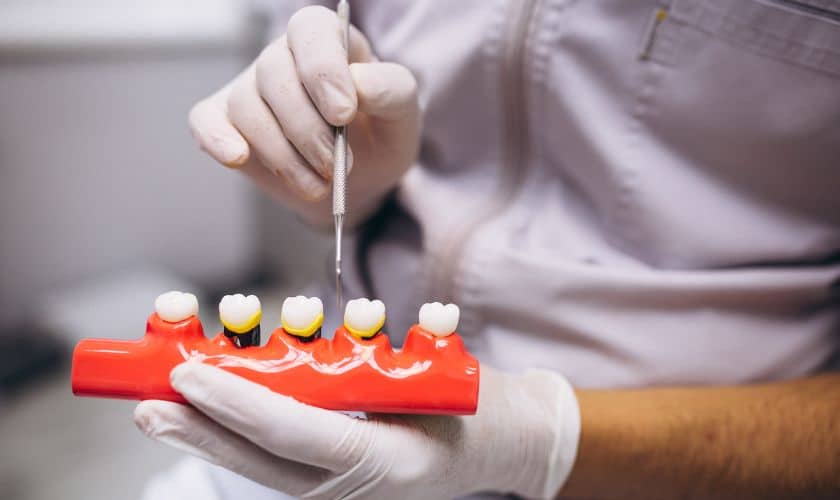Are you tired of hiding your smile because of a damaged tooth? Do you want to restore the appearance and functionality of your teeth without undergoing an invasive procedure? Look no further than a dental crown! A dental crown is a versatile solution that can repair and protect damaged teeth, giving you a beautiful and healthy smile. In this blog post, we’ll explore what exactly a dental crown is, how it works, its various types and advantages, as well as tips for caring for your crown. So sit back, relax, and let’s dive into the world of dental crowns!
What is a dental crown?
A dental crown is a cap that covers an existing tooth to restore its shape, size, strength and appearance. It is a common dental procedure used to repair teeth that have been damaged by decay, cracks or fractures. A dental crown can also be used to protect weak teeth from further damage or as a support for bridges and implants.
The process of getting a dental crown involves several steps. First, the dentist will prepare the tooth by removing any decay or old filling material. Then, they will take an impression of the prepared tooth to create a custom-made crown in a laboratory. In the meantime, the patient may wear a temporary crown until their permanent one is ready.
Dental crowns are made from various materials such as porcelain, ceramic, metal alloys and composite resin. The choice of material depends on factors like durability, aesthetics and cost. Porcelain and ceramic crowns are popular options because they mimic natural teeth in color and texture.
Dental crowns offer many benefits for patients with damaged or weakened teeth. They provide long-lasting protection against further decay or fracture while improving both function and appearance of your smile.
How does a dental crown work?
A dental crown is a tooth-shaped cap that covers and encases the damaged or decayed tooth, restoring its shape, size, strength, and appearance.
The process of getting a dental crown usually involves two visits to the dentist’s office. During the first visit, the dentist will prepare your tooth by removing any decay or damage and shaping it to fit the crown. An impression of your teeth will then be taken and sent to a laboratory where your custom-made crown will be fabricated.
Once your permanent crown is ready, you’ll return for a second visit where the dentist will place it onto your prepared tooth using dental cement. The new restoration should blend in seamlessly with your natural teeth.
Dental crowns work by providing an additional layer of protection for weakened or broken teeth while also improving their aesthetic appearance. They can help prevent further damage from occurring due to chewing forces or infection.
Dental crowns provide an effective solution for repairing and protecting damaged teeth while simultaneously enhancing their appearance. With proper care and maintenance, they can last anywhere from 5-15 years or even longer!
Types of dental crowns
Dental crowns come in different types, and the choice of crown material depends on several factors such as location, tooth function, aesthetic preference, and cost. Here are some of the most common types of dental crowns:
1. Ceramic Crowns: These are made from porcelain or ceramic materials that closely resemble natural teeth in color and translucency. They’re ideal for restoring front teeth because they look very natural.
2. Metal Crowns: These are made from gold alloys or base metal alloys such as nickel-chromium or cobalt-chromium. Metal crowns offer excellent durability but aren’t usually used for visible front teeth due to their metallic appearance.
3. Porcelain-fused-to-metal (PFM) Crowns: This type consists of a metal substructure covered with a porcelain layer that matches the adjacent natural teeth’s color.
4. Zirconia Crowns: These are increasingly popular due to their superior strength compared to other crown materials like ceramics or PFM.
5. Composite Resin Crown: This is an affordable option for patients who need a temporary solution before getting permanent restorations; however, it isn’t as durable as other crown types.
It’s important to consult your dentist about which type of dental crown would be best suited for your specific needs so you can get optimal results and satisfaction with your restoration!
Advantages of dental crowns
Dental crowns are an excellent solution for repairing and protecting damaged teeth. There are several advantages to getting a dental crown, including:
1) Protection: One of the most significant benefits of a dental crown is that it protects your tooth from further damage. It covers the entire visible portion of the tooth, shielding it from harmful bacteria and decay.
2) Durability: Dental crowns are incredibly durable and can last up to 15 years with proper care. They are made from sturdy materials such as porcelain or ceramic, which can withstand daily wear and tear.
3) Improved Appearance: A dental crown can improve the appearance of a damaged tooth significantly. Crowns are custom-made to match your natural teeth’ color, shape, and size so that they blend in seamlessly.
4) Comfort: If you have sensitive teeth or pain when chewing, a dental crown can provide much-needed relief. The smooth surface of the crown is gentle on your gums and won’t cause any discomfort while eating or brushing.
5) Versatility: Dental crowns can be used for various purposes such as restoring severely decayed teeth, covering up discolored or misshapen teeth, holding together cracked or broken teeth, and protecting weakened teeth after root canal treatment.
Getting a dental crown has many advantages that make it an excellent investment in your oral health. Talk to your dentist today about whether this solution could benefit you!
How to care for your dental crown
Proper care and maintenance can help your dental crown last for many years. Here are some tips on how to take care of it:
Firstly, avoid chewing hard or sticky foods as they can cause damage to the crown. This includes ice, popcorn kernels, and caramel candies.
Secondly, maintain good oral hygiene by brushing twice a day with fluoride toothpaste and flossing daily around the crown area.
Thirdly, visit your dentist regularly for professional cleanings to ensure that there is no decay or gum disease present in the surrounding teeth.
Fourthly, if you grind your teeth at night (bruxism), talk to your dentist about getting a mouthguard to protect both your natural teeth and the crown from damage.
Be sure not to use your teeth as tools such as opening packaging or biting nails.
By following these simple steps and taking proper care of your dental crowns, you can ensure that they will remain functional and aesthetically pleasing for many years!
Conclusion
Dental crowns provide an effective solution for repairing and protecting damaged teeth. They are durable, long-lasting, and can be customized to match the color of your natural teeth. With proper care, they can last up to 15 years or more. If you have a damaged tooth that needs repair or protection, talk to your dentist about getting a dental crown. They will assess your specific needs and help you choose the best type of crown for your situation. Remember that good oral hygiene is crucial in maintaining the longevity of your dental crown. Brush twice daily with fluoride toothpaste, floss regularly, and schedule regular check-ups with your dentist.
Investing in a dental crown not only improves the appearance of your smile but also restores functionality to damaged teeth. Don’t let a damaged tooth affect your quality of life any longer – consider getting a dental crown today!




